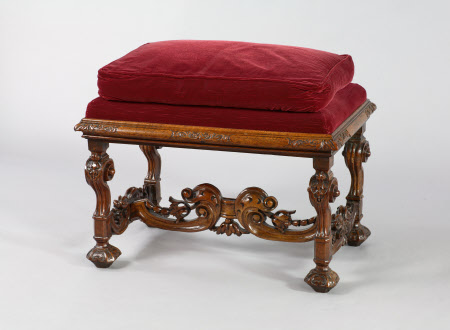Stool
attributed to Thomas Roberts (fl.1686-1714)
Category
Furniture
Date
circa 1702
Materials
Carved walnut, later red velvet upholstery
Measurements
62 x 74 cm
Place of origin
'The Royal Chair', Marylebone Street, Westminster, London, England
Order this imageCollection
Hardwick Hall, Derbyshire
NT 1127752.11
Summary
One rectangular stool, from a rare set of twelve carved walnut stools, English, circa 1702, attributed to Thomas Roberts (fl. 1686 - 1714), comprising two circular stools [NT 1127752.1 & 2], six long stools, or 'bankettes' as they were known [NT 1127752.3 - 8] and three other rectangular stools [NT 1127752.9 - 10 & 12]. The rectangular stool with loose cushion upholstered in later red velvet, the seat pad also upholstered in red velvet, the moulded seat rails with alternating lengths of plain moulding and reserves of foliated scrolls, raised on four rectangular-section scrolling supports, each leg with a lower collar attaching the scrolling and harebell-carved side stretchers, the feet of tapering square-section and carved with scrolls. Thomas Roberts (fl. 1685 - 1714) was a 'joiner' who supplied royal palaces with furniture between 1685 and 1714. In 1697, he made an elaborate firescreen for Windsor Castle. Roberts was also employed at Chatsworth and paid in 1702 for 'walnut armchairs, two large saffaws and six bankettes', an order to which these stools could relate. These stools attributed to Roberts on the basis of the foliated scrolls carved to the corners and centre of each seat rail, an unusual feature found also on documented pieces of furniture known to be his work. See, for instance, NT 1127754 & 1127755, also attributed to Roberts, for a pair of chairs and five matching stools with the same enriched mouldings. This attribution is strengthened by the survival of a very similar set of documented stools at Hampton Court Palace.
Provenance
Presumed commissioned for Chatsworth in 1702, and later brought to Hardwick Hall in the 19th century, probably by the 6th Duke in the 1820s. Photographed in the High Great Chamber in 1928 [Country Life Images]. Transferred to the National Trust from the Treasury in 1984.
Makers and roles
attributed to Thomas Roberts (fl.1686-1714), joiner
References
Bowett 2000: Adam Bowett, 'The English "cross-frame" chair, 1694-1715', The Burlington Magazine 142/1167 (June 2000): 344-352, p. 345 Edwards, Ralph, 1894-1977 shorter dictionary of English furniture : 1964., p. 503, Figure 27
